|
Professor Bill Lamp & colleagues part of multi-state team studying diverse perennial forage systems. Lamp says, “We want to test that growing diverse species of crops, and using perennial crops, will add more beneficial insects to the farm. We are especially interested in ‘conservation biological control,’ in which populations of natural enemies of pests are enhanced by diverse, perennial crops.” Full AGNR press release: https://agnr.umd.edu/news/entomology-and-extension-faculty-join-national-team-study-and-support-diverse-perennial-forage?fbclid=IwAR26bwOizAlo1wLYMflnzqnq3tMCMMY-V75XdUDOV3GwLQNJBSNy83FnZd4
Share on facebook and twitter
written by Angela Saenz & Alireza Shokoohi
Dr. Miguel Altieri is a Chilean agronomist and entomologist that has dedicated his life and career to agroecology. He is currently an emeritus professor from the University of California, Berkeley, where he teaches sustainable management practices to enhance biological control on farms. He is also a part-time farmer in the slopes of the Colombian Andes and the co-director of CELIA (Centro Latinoamericano de Investigaciones Agroecológicas), an organization focused on teaching, extension, and outreach for small farmers and research for food production through biodiverse systems.  Photo credit: Frontiers Photo credit: Frontiers UMD Research Associate & Lecturer Magdalene Ngeve and her colleagues have a new publication out in Frontiers in Conservation Science that takes a closer look at Rhizophora propagules to better understand the dispersal and connectivity of mangroves. Their study shows drift Rhizophora propagules found on a beach area in Cameroon originated well beyond the Cameroonian borders, probably from the south and/or other Atlantic island, pointing to long distance dispersal of mangroves. The evidence of this transboundary dispersal of propagules highlights the need for intergovernmental efforts in mangrove biodiversity protection. Follow link to see publication: https://doi.org/10.3389/fcosc.2021.746461 & share with your networks via facebook and twitter |
Categories
All
Archives
June 2024
|
Department of Entomology
University of Maryland
4112 Plant Sciences Building
College Park, MD 20742-4454
USA
Telephone: 301.405.3911
Fax: 301.314.9290
University of Maryland
4112 Plant Sciences Building
College Park, MD 20742-4454
USA
Telephone: 301.405.3911
Fax: 301.314.9290


 RSS Feed
RSS Feed




